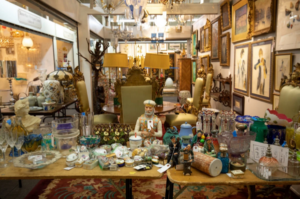QUESTION OF THE WEEK: July 5, 2021.
Do you have a question and want to possibly be featured? E-mail me here and I’ll do my best to answer. Be sure to include QUESTION OF THE WEEK as the subject line. Keep in mind my answers here are mostly general and should not take the place of a formal appraisal.
QUESTION: “What’s something in an antique store that has value but often is overlooked?” Fr ed in Chicago, Illinois.
ed in Chicago, Illinois.
ANSWER: The most valuable thing in any antique store is floor space because that’s what pays the bills, the mortgage, the utilities, salaries and so on. If a store is overcrowded, especially with large furniture, that means there’s a likelihood the store owner will be receptive to lower offers. It’s in the store’s best interest to keep products moving. If a dining room set just arrived, the store owner might not come down in price too much. But if it’s sat there for six months, the store owner might be ready to negotiate. The larger the item, the more floor space it takes up, the more effort it takes to physically move it and the more money it costs just to store the it. So the longer a piece sits around the more it cuts into the store’s profits. This mostly applies to large items – they take up the most floor space. A store owner can wait longer on smaller items because they don’t take up much floor space. When I was a buyer for my family’s antique stores, there was usually a 100 percent markup from what we paid for an item to what we offered it for. If I bought a table at auction for $100, we might slap a $1,000 asking price on it. That gave us a lot of leeway to negotiate and still turn a profit, kind of. But the longer an item sits, the lower the profit.
Most antique dealers know what they have, what they paid for it and what they can sell it for and still make money. You’re typically not going to out negotiate them given these factors. If you’ve absolutely fallen in love with a fainting sofa your favorite antique store just brought in, wait a little while. The longer you wait, the more likely the antique dealer will negotiate. It’s a gamble, but it could save you money in the end.
Where you can find things that are overlooked and underpriced are garage sales, estate sales and auctions. This is where most antique dealers buy their inventory because it’s usually at a significant markdown from where they can offer it.
With garage and estate sales, it’s not uncommon to find eager sellers who either don’t know what they have or know what they have but just need to get rid of it. There are deals to be found.
Auctioneers typically know what they have but are looking to sell because they only get paid when things sell. If competition is light for a particular piece, you can buy things well below asking prices in antique stores.
Have more questions? E-mail me at grantmiller@grantmillerappraisals.com. In Illinois and looking for an art or antiques appraiser? Call or text me at 813-240-4586 (Chicago and elsewhere).